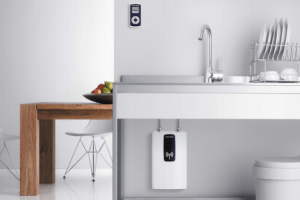With many people choosing more eco-friendly options for providing their home with energy and heating, electrical heating is becoming a popular option. Not only is it seen as a better option for energy usage, but it’s also cost-effective. Here, we will talk about the ways in which you can keep your home warm using electrical central heating. We will discuss the pros and cons, plus the average costs.
Electrical Central Heating: Night storage heaters
The most cost-effective form of electric central heating uses night storage heaters. These use electricity that is supplied at a cheaper “night-time” rate, heating up special ceramic bricks that are designed to hold heat. They slowly release heat, keeping the home warm throughout the next day. Once the heat runs out, you must wait until the next night for them to reheat. This will mean that your home will be cooler in the evening. The good news, however, is that some storage heaters allow you to turn on immediate heat at any point in the day.
Modern storage heaters and electric radiators
There has been a huge development in storage heater technology since first being introduced in the 60s. There are many additional options for modern storage heaters, including:
- Remote wi-fi controls
- Fans tend to disseminate the heat
- Open window detectors
All electrical heaters now come with a thermostat, 24-hour and 7-day programmable timers, temperature controls and fans. Older models made before this may still be available, so we highly suggest you look at a newer model instead. Modern high-retention storage heaters can hold up to 45 per cent more heat 24 hours after being charged. This means that you are less likely to be cold during the evening.
You can also fit electric radiators that work with standard electricity tariffs, so you can switch them on and off to keep your home warm whenever you need. However, this will cost extra. You also have other heating options such as biomass stoves, a heat pump or solar panels.
Economy 7 and Economy 10
If you choose night storage heaters, you will probably power these using a special electricity tariff that offers cheaper electricity rates at night. These are often known as Economy 7 as they give you 7 hours of cheaper electricity overnight. Economy 10 works in a similar way, giving you an extra 3 hours of cheaper electricity. This is usually in the middle of the afternoon.
Other meter types, including white meters and grey meters, are fitted alongside specific electric heating types and provide particular tariffs. Smart meters also enable time-of-use charging for electricity. Some companies have launched tariffs that offer more affordable rates at times of lower demand for electricity.
Cheap-rate electricity can also be used for providing hot water via an immersion heater in your hot water tank. You can also run electric radiators with a standard single-rate electricity tariff. However, due to these tariffs costing more than economy 7 and 10, these can be expensive to run. They should only be considered if you have an extremely well-insulated property and only need them from time to time.
The annual cost of electricity
The average annual cost for heating and hot water using electricity in the UK would be around £776 per year based on using around 4,200kWh of electricity and are using a standard single-rate tariff. If you have electric central heating and water heating, it is likely that you will be on economy 7 or 10. You can lower your bills by making the most of cheaper off-peak rates. Many other factors affect heating bills, including the age and size of a property, how well it’s insulated, hot water and heating system efficiency, how much you use it and where you live in the UK.
Pros and Cons
Here are just a few benefits of choosing electrical central heating for your home:
- Electric night storage heaters are much cheaper to install than gas systems as they don’t need pipework.
- With very few moving parts, storage heaters need very little maintenance and don’t require annual servicing.
- Unlike gas, mains electricity is available almost everywhere in the UK
Of course, everything comes with downsides. Here are just a few to consider before you make a decision:
- Electricity prices can be 3-4 times higher than gas prices per unit of energy
- Around 40 per cent of electricity in the UK is generated in gas-fired power stations, with electricity costs reflecting any potential increase in gas prices
- Daytime rates on economy 7 or 10 tariffs are higher than on standard single-rate electricity tariffs. This means that despite getting cheaper heating, it could cost more to run appliances during the day
- If you have not switched the heating on lately and switch on your night storage heater, you will not get heat until the next night
Are you considering electrical central heating?
If you decide this is the right choice for your home, investing in the right products to keep your home heated is essential. If you’re not entirely sure what you need, you can always talk to us. Get in touch with ABM Electrical Wholesalers today to see how we can find you the perfect electrical products for your home.




